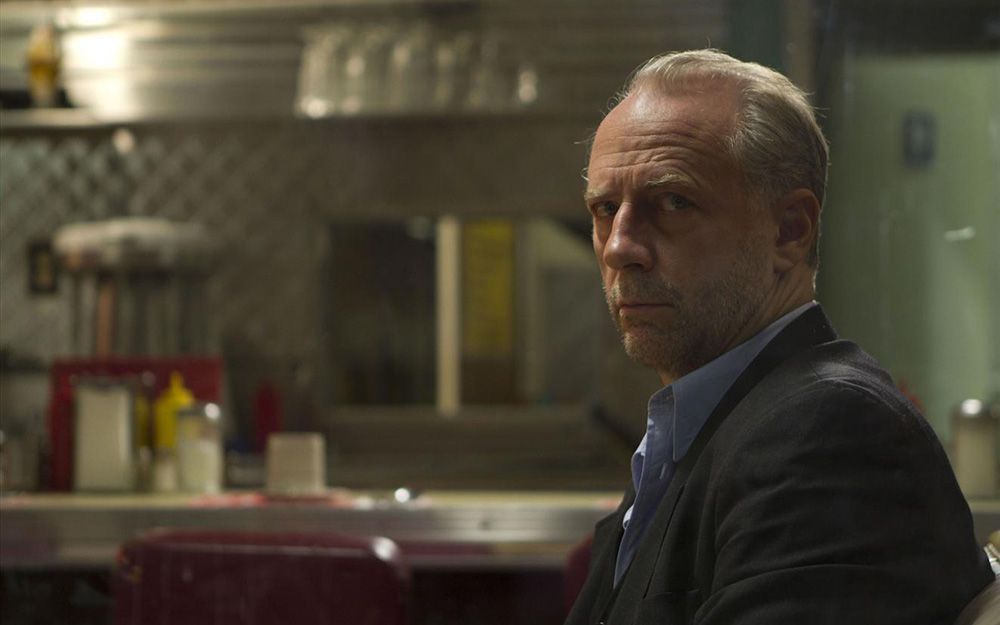The Televangelist: The Man in the Booth Wants to Make You a Deal

Each Friday in The Televangelist, Richard Clark examines the met and missed potential of television. This week, Jason Morehead fills in.
In the corner of the Cadillac Jacks Drive-In, there’s a booth. And in this booth, there’s a Man. A Man who will give you your heart’s desire. But he wants something in return. Something small and insignificant… like killing a young child, protecting a dirty cop, or setting off a bomb in a coffeeshop. But in return, your child will live, your career will be safe, your husband will be returned to you.
Want to make a deal?
Playing like an extended The Twilight Zone episode, The Booth at the End uses a “less is more” approach and a healthy dollop of ambiguity to craft an intricate morality play. The series, which lasts five episodes, takes place entirely within the Man’s booth and uses this minimal set to great advantage. All we know is what we observe in the characters’ conversations with the Man. The change in someone’s posture as they go about fulfilling the Man’s terms, the jewelry someone is (or isn’t) wearing — these little details matter.
They become more important as the storylines begin overlapping and colliding. There are twists a-plenty throughout The Booth at the End, and the series juggles them all with aplomb, bringing them to believable, thought not always pleasant, conclusions. Some characters become better, some become worse, and some vacillate between the two right up until the end as they struggle to make sense of the Man’s deals.
But who, or what, is the Man? Is he Someone special, testing people for their possible redemption? Is he someone far more infernal, crafting Faustian bargains to bring them to ruin? The series leaves the possibilities open right up to the very end, and even then, who knows? This ambiguity could’ve been disappointing a la Lost, but I found it intriguing. Much credit goes to Xander Berkeley, whose performance ranges from cool menace as he calmly lays out his impossible deals to humor and even dismay when the other characters report in with their progress. He’s enigmatic without ever being obtuse, and even generates an air of pathos as the series continues.
Most people (hopefully) find the thought of killing a small child or setting off a bomb in a coffeeshop to be despicable, and all the moreso were it done for personal or selfish reasons. We’d like to think that we would never do something like that, not in a million years. But The Booth and the End suggests something else, that decent people are willing to set aside what they know to be right to get what they want — especially if they want something truly good. But while we may never be put in a position where we (feel like we) must commit murder, how many times are we willing to make smaller sacrifices and commit smaller sins to get what we desire? As Joseph Susanka writes in his review:
“Two wrongs don’t make a right” is the sensible response to the choices confronting James, Mrs. Tyler, and their fellow sufferers, but the viewer is not let off the hook with that casual truism, because ultimately The Booth is a singe to the conscience: How often are we willing to compromise on smaller matters, setting aside what we know to be right and just for the sake of our own desires? Surely, we would not kill another to further our own ends, but how many of us are willing to ridicule and belittle others in the feverish building up of our own importance? Few of us stand ready to rob a bank for the sake of our own beauty, yet the number of those prepared to wage a costly and outlandish battle against the natural decline of their physical form is frighteningly large. Are those two groups really so far apart? How far will we go to get what we want?
How far, indeed.
The Booth at the End is currently streaming, for free, on Hulu.
This entry was originally published on Christ and Pop Culture on .